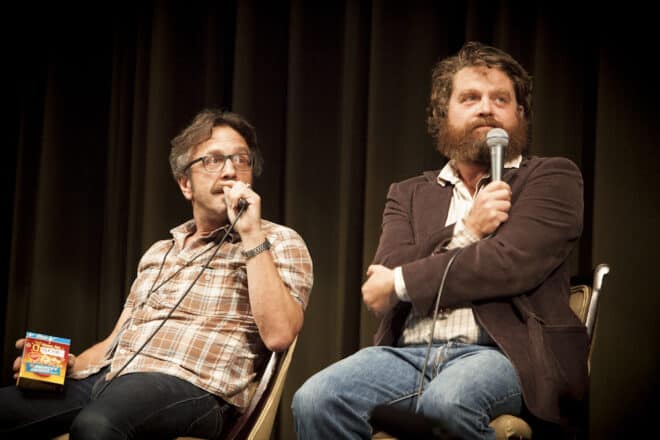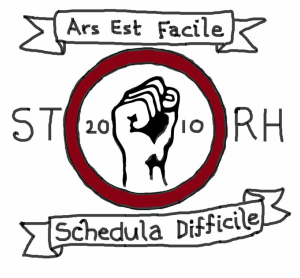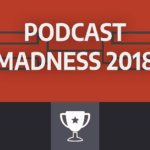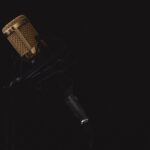To Live & Pod in L.A.: Memories of the Comedy Podcast Boom

In December 2006, days after graduating from Arizona State, I drove away from my hometown of Phoenix towards Los Angeles. It wasn’t to pursue success in the L.A. comedy podcast scene, because that wasn’t a thing yet. However, it would be in just a few short years. I still wouldn’t exactly become a “success” within it. But I’ll be damned if I shouldn’t take credit for being one of the pioneers.
I had some beginner’s luck in my new city professionally, scoring small acting roles, booking shows as a solo musician, grabbing paid freelance writing gigs, and securing regular work in reality television post-production. I met a community of friends through ASpecialThing.com, a comedy fan site and forum created by Matt Belknap. One such friend was Burbank standup comic Gene George. We both had aspirations to do… something. We were listening to the podcasts that’d began to pop up online, like one produced by Belknap called Never Not Funny, hosted by Jimmy Pardo. It was, and remains, a very slick, well-run program with celebrity guests.
Gene and I wondered if we could do something similar but a little less showbiz, a little more DIY. As writers and performers ourselves, we’d gathered some connections, so there was a wide potential for guests. In titling our show, I’d found trivia about CB radio slang — apparently L.A. was known as “Shakeytown” by truckers. And that’s how in 2010, Shakeytown Radio was born.

Gene had external hard drives and Blue microphones. I had a Mac with GarageBand, and most importantly, plenty of patience for editing. We familiarized ourselves with RSS feeds, using Podbean as the host and FeedBurner to deliver it to iTunes. We did test minisodes, the two of us riffing and sharing anecdotes. Then we recorded a pilot with my friend and neighbor Tom Neely, a comic book artist who’d soon gain notoriety for the Igloo Tornado collective book Henry and Glenn, a graphic novel imagining the Rollins Band and Danzig frontmen as domestic partners.
We recorded much of the first couple years from Gene’s kitchen table, his sweet, elderly mother sometimes interrupting to run the dishwasher. Or, from my living room table, with any one of a number of cats jumping up and rustling the mic. We found conditions for recording to be much easier when higher profile guests invited us to record them in their very nice homes in wealthy neighborhoods.
Before she would start her own true crime podcast My Favorite Murder, Karen Kilgariff sat at the kitchen table and talked about dread on the college comedy circuit.
That was the cool thing about starting a comedy podcast in L.A. before most people were listening to them, before there was any such thing as podcast networks like Earwolf or Nerdist, and before too many Hollywood notables like Dan Harmon or Conan O’ Brien were starting their own. There were artists and performers, with names people knew and stories that people wanted to hear, who were returning our messages and excited about sitting down with us. They were also incredibly understanding with the frequent technical issues that plagued our early years of recording, with glitchy mics and recording software that often halted people mid-sentence.
Jen Kirkman, who’d go onto be a New York Times bestselling author and frequent face on Drunk History and Chelsea Lately, was someone Gene knew from standup and I knew because we’d both written for a comedy magazine called Modest Proposal. I tracked down one of Gene’s all time favorites, Saturday Night Live writer and Square Pegs creator Anne Beatts, and she talked to us in her lovely home for hours. Gene was buddies with Ben Acker and Ben Blacker, television writers and the creators of The Thrilling Adventure Hour, so we got to chat with them, and that made us a credible enough show to have on a fan favorite like genre screenwriter Jane Espenson.
These were the hilarious and adventurous times of Shakeytown Radio, the comedy years when it was just Gene and I. We went to Kevin Pollak’s house in Venice to hear never-before-told stories about working with Denzel Washington and John Lithgow on the set of Ricochet. I met up with James Adomian at the Dresden Room to sneak in a recording before Marty and Elayne did a set. Before she would start her own true crime podcast My Favorite Murder, Karen Kilgariff sat at the kitchen table and talked about dread on the college comedy circuit. Before he was a controversial political pundit, Jimmy Dore smoked weed in my backyard and talked about commercial auditions. I was over the moon to meet character actors like Lauren Weedman, Beth Grant, and James Urbaniak (who lingered after to check out my neighbor’s garage sale).
There were some lows, too.
Acker and Blacker worked with a dude who’d been a regular on Buffy the Vampire Slayer, and the guy also sang for a band. Gene and I hoofed it to his house to meet him and his bandmates, proceeding to have the most lackluster conversation ever recorded on a Shakeytown podcast. I’d got the impression we were there to mostly discuss the band, but the aloof singer pulled a reverse Billy Bob Thornton, seeming offended I wasn’t asking more about his acting career. I later sent him a high definition file of the band’s live performance we had recorded, as a peace offering. He never responded.
Pathways that popped up led to dead ends — like the time I got fired by Marc Maron. Sort of.
Gene and I had some creative frustrations, as well. We were overwhelmed by day jobs and family obligations, and it felt like the little free time left for Shakeytown Radio, while providing a decent spotlight for our guests and their work, prevented us from pursuing our own creative goals. So we brought in Gene’s comedy pal Libby Ward and my old friend Bob Schriner, a legendary humorist and prankster in his own right, and tried to work sketch comedy into the mix. While we pulled off one holiday special that I’m still extremely proud of (a Christmas Carol parody, naturally, starting with a visit from the ghosts of Bob Marley, the dog from Marley and Me, and the basketball career of Dan Majerle), coordinating four individuals’ schedules and senses of humor was much more daunting than anticipated. Bob and Libby ended up serving more as guest hosts, rather than us four becoming a comedy troupe.
My disillusionment with the industry also began to set in. I was drifting from comedy and finding more comfort in readings, storytelling shows, small press, and the literary community. I went to graduate school to hone my fiction and wanted to be a novelist instead of a screenwriter. My career in television was stagnating, and I lost faith in being able to break into scripted work. Pathways that popped up led to dead ends — like the time I got fired by Marc Maron. Sort of.
Maron started an interview podcast called WTF. It was in the same spirit of what we were doing, and as years passed, what a lot more people were doing. More high profile people who could book increasingly hard-to-get guests were starting podcasts, joining new podcast networks, and quickly gaining way bigger audiences than Gene and I could have ever gathered as two not-famous guys. They also had money to spend, monetizing their podcasts while Gene and I still paid for everything out of pocket.
Read more: What Podcasts Can Learn From the Radio
Maron even had an assistant. She was a friend of mine and Gene’s, someone we knew through AST. She knew I’d done transcription work for reality TV (logging footage, transcribing cast interviews and confessionals), and set me up to be Maron’s transcriber for $20 an hour as he read from old diaries that he’d publish excerpts from in his next book.
I drove to his famous “Cat Ranch” in the Highland Park neighborhood. He was very nice, relaxed, and welcoming. He showed me around the house, and as he grabbed me a fizzy water, I mentioned offhand that an ex who I was still friendly with was a big fan of Maron’s and excited to hear I was working with him. That got him asking me about that former relationship and more personal questions as we walked out to the garage where he recorded, the same studio President Barack Obama would visit a few years later. Maron is a natural interviewer, he really could have been a psychologist (or maybe a police interrogator). He got me to open up very fast. And then, he shared his own personal takes based on his past, and that was all before he got vulnerable by reading his old journals for me to type out. I couldn’t believe this was all happening, that maybe I’d found a mentor, a confidante, and possible boss.
Then… nothing. For weeks. My friend, Maron’s assistant, had no idea what was going on either. She said they were too busy with WTF business for it even to be appropriate timing for her to ask him about me. So I just kept listening to his show, which I was already a fan of, to see if he’d mention his book or the transcriber he’d had over. Instead, he talked about how he’d started looking at some old journals for his next book, and how he’d bought some speech-to-text software for transcription purposes.
Well… at least I got $20 and a fizzy water.
Gene became less available as he got ready to welcome his second child. His last episode hosting before an extended hiatus coinciding with the new baby was a repeat visit by our debut guest Tom, as well as his artist friends Keenan Keller and Alex Chiu. They were there to promote a new event they were involved in, L.A. Zine Fest. I checked out the event after the episode aired, as well as some affiliated workshops. I was approached by organizers, who’d enjoyed the podcast, about lending a hand with their subsequent events.
Looking back at the timeline, I realize Gene and I got started at the same time as the Joe Rogans, Adam Carrollas, and numerous other cishet white men who soon flooded iTunes.
It was that circle that got their clutches in me for my last few years in L.A. and my last few years producing Shakeytown Radio, which shifted more on interviewing independent writers and illustrators. My time amongst that group, in the events I was organizing and projects I was leading, and this whole new set of tumultuous relationships and headaches starting to form, unfortunately pulled my attention away from everything else. I impulsively and abruptly announced the end of the podcast while recording live at Riverside DIY Print Fest in 2014, hosting by myself. The following year was month after month of what I refused to untangle managing to unravel all on its own. Some necessary lifestyle changes (this is a euphemism for “repairing the wreck I had made of my neglected health and personal life”) led me to move back to Arizona in 2015, where I’ve continued writing and creating video content. (And things did get better.)
Looking back at the timeline, I realize Gene and I got started at the same time as the Joe Rogans, Adam Carrollas, and numerous other cishet white men who soon flooded iTunes. I’m sure a listener could comb through the archives and find a joke or comment that crash lands a decade later. (Hell, we had Jason Nash on, we had no idea then what allegations would come in 2021.) But I’m proud of the conversations we had and the people we tried to elevate on our show, even as the audience saw mine and the show’s focus change onto people I’d now consider estranged or former friends.
Read more: The fallout of Joe Rogan joining Spotify
Gene and I used our humble platform to inform our audience of people and work we thought they’d love like we did. We laughed and shared stories, and explored a wide variety of topics. A chat with filmmaker Roger Nygard inadvertently nudged me, a kid raised in Christianity, to atheism. Some of the people I consider my closest friends, who I trust and who stood by me through rough times and hard transitions, were people whose first interactions with me were about them appearing on the show. And my experience made me extremely comfortable with public speaking and being interviewed, which has led to opportunities leading or appearing on panels and guesting on other people’s podcasts (best of all, they’re the ones who get stuck with all the editing duties now instead of me).
I can call up my buddy Gene, both of us married and now both fathers to two kids, and recollect fondly on snagging tickets for a taping of a Paul F. Tompkins comedy special. Or I can reminisce with Bob about spoken word shows he emceed, or the morning he helped my newlywed wife and I move into our new house. Or I can call Libby the next time she passes through Arizona, and look at the pictures of our one night only band that somehow got a set at The Smell in downtown L.A.
I didn’t profit from the comedy podcast boom, and life was hard in Shakeytown. But it was worth it.













Comments
Comments are closed.